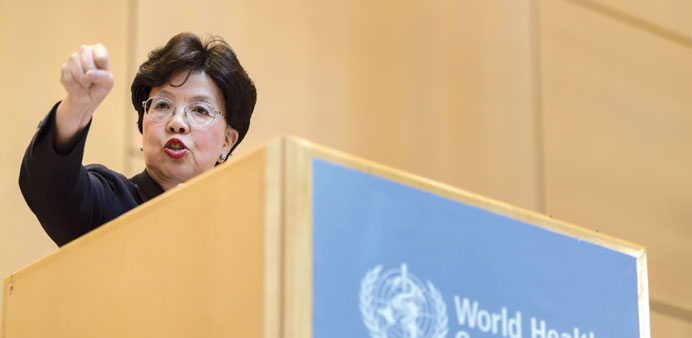Reuters/AFP
London
Experts called yesterday for urgent, root-and-branch changes to the World Health Organisation (WHO) after an inadequate response to West Africa’s vast and deadly Ebola outbreak.
The UN agency “does not currently possess the capacity or organisational culture to deliver a full emergency public health response”, a panel of independent experts said in a report on the WHO’s handling of the Ebola crisis.
The panel recommended that a $100mn contingency fund, suggested by the WHO for future emergencies, be fully financed by member states.
It also called for the creation of a separate emergency preparedness and response unit within the WHO.
“This is a defining moment for the health of the global community,” the report said. “(The) WHO must re-establish its pre-eminence as the guardian of global public health. This will require significant changes.”
Geneva-based WHO has been widely criticised for its response to the Ebola epidemic – which killed more than 11,000 people in Guinea, Liberia and Sierra Leone – and for its early assurances that the disease was under control despite repeated warnings to the contrary by the charity Medecins Sans Frontieres (MSF).
WHO Director-General Margaret Chan admitted in May it had been “overwhelmed” by the Ebola epidemic and “ought to have reacted far earlier”.
Responding to yesterday’s report, the WHO said that it was already moving forward on some of the panel’s recommendations, including the development of the emergency unit and the contingency fund.
The expert panel also said the 2005 International Health Regulations, agreed by 196 WHO member countries to try to track and control the spread of disease, must be strengthened and properly implemented to allow proper handling of epidemics.
The WHO “tends to adopt a reactive, rather than a proactive approach to emergencies” and failed to act on the warnings of experienced staff on the ground, the panel said.
“The world simply cannot afford another period of inaction until the next health crisis,” it said.
The panel also criticised the WHO’s early engagement with local communities about what could be done to reduce the spread of Ebola, and its failure to provide authoritative information on what was happening.
In Guinea, it said, communities are still not convinced of their own responsibilities with regard to declaring contact with infected patients and ensuring victims are safely buried, making it difficult to eliminate the virus.
“The panel is convinced that WHO must make fundamental changes, particularly in terms of leadership and decision-making processes, in order to deliver on this mandate,” the report concluded.
“But it will also require the resources and political will of the member states to make WHO the agency that can fulfil this mandate in the 21st century. This transformation must be carried out urgently.”
The 2005 International Health Regulations were reviewed and changes recommended in 2011 after the 2009/2010 H1N1 flu pandemic, the panel said, but many countries have not acted on that review – a failure that made the Ebola response even worse.
“Had the (2011) recommendations for revision ... been implemented, the global community would have been in a far better position to face the Ebola crisis,” it said.
The panel declined to call for any resignations at the WHO, and warned that part of the problem was that its purchasing power had fallen by one third since 2000.
“You cannot expect an organisation to be taking on more and more of these global outbreaks and yet have a declining budget at the same time,” said Barbara Stocking, the head of the panel and former head of development agency Oxfam.
Her team recommended that regular member state contributions be increased by 5% and called for a separate $100mn (€92mn) emergency contingency fund.
It said the WHO should set up a new emergency centre to respond to and manage global crises, a move that was preferable to creating a dedicated UN mission for each emergency, as occurred with Ebola.
The experts also welcomed plans to train more rapid response staff, which the WHO says are already underway.
Other factors also contributed to the slow global response, however, including the failure of countries to properly prepare for health outbreaks and their reluctance to declare possible epidemics.
The panel proposed some form of financial incentive for countries to declare health emergencies such as an insurance system to help with economic losses.
Jeremy Farrar, the director of the Wellcome Trust global health charity who has previously called for a separate emergency response unit to be established within the WHO, urged governments to support the panel’s recommendations.
“It’s essential that this new body is accountable and can show leadership in the face of emerging health threats, with the authority and independence to act quickly when needed,” he said. “The support of the global community is also crucial if we are to avert another catastrophe on the scale of Ebola.”

Chan: admitted in May that the WHO had been ‘overwhelmed’ by the Ebola epidemic and ‘ought to have reacted far earlier’.
